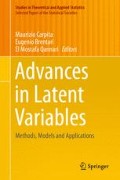Abstract
We present a lexical-based investigation into the corpus of the opera omnia of Seneca. By applying a number of statistical techniques to textual data we aim to automatically collect similar texts into closely related groups. We demonstrate that our objective and unsupervised method is able to distinguish the texts by work and genre.
Access this chapter
Tax calculation will be finalised at checkout
Purchases are for personal use only
Notes
- 1.
In more detail, the first two principal components explain the 0.902 of the variance, this proportion resulting from the sum of the explaining power of each of the two components (respectively, 0.876 and 0.026).
- 2.
References
Beck, J.W: «Octavia» Anonymi: zeitnahe «praetexta» oder zeitlose «tragoedia»?: mit einem Anhang zur Struktur des Dramas, Duehrkohp und Radicke, Göttingen (Göttinger Forum für Altertumswissenschaft. Beihefte 15) (2004)
Bruckner, F.: Interpretationen zur Pseudo-Seneca-Tragödie Octavia, Offsetdruckerei Hogl, Erlangen (1976)
del Río Sanz, E.: Problemas de autenticidad del Hercules Oetaeus. Estado de la cuestión, Cuadernos de Investigación Filológica, XII-XIII, 147–153 (1987)
Feinerer, I., Hornik, K.: tm: Text Mining Package. R package version 0.5-9.1. http://CRAN.R-project.org/package=tm (2013)
Feinerer, I., Hornik, K., Meyer, D.: Text mining infrastructure in R. J. Stat. Softw. 25(5), 1–54. http://www.jstatsoft.org/v25/i05/ (2008)
Firth, J.R.: Papers in Linguistics 1934–1951. London University Press, London (1957)
Giancotti, F.: L’Octavia attribuita a Seneca. Loescher-Chiantore, Torino (1954)
Greenacre, M.: Biplots in Practice. Fundación BBVA, Madrid (2010)
Harris, Z.S.: Distributional structure. Word 10, 146–162 (1954)
Iorio, V.: L’autenticità della tragedia Hercules Oetaeus di Seneca. Rivista Indo-Greca-Italica di filologia, lingua, antichità, 20, 1–59 (1936)
Johnson, R.A., Wichern, D.W.: Applied Multivariate Statistical Analysis. Prentice Hall, Upper Saddle River (2002)
Meyer, D., Buchta, C.: proxy: Distance and Similarity Measures. R package version 0.4-10. http://cran.r-project.org/web/packages/proxy/index.html (2013)
Paratore, E.: Lo Hercules Oetaeus è di Seneca ed è anteriore al Furens, in Acta classica: verhandelinge van die Klassieke Vereniging van Suid-Afrika = Proceedings of the Classical Association of South Africa, I, 72–79 (1958)
R Core Team: R: A language and environment for statistical computing. R Foundation for Statistical Computing, Vienna, Austria. ISBN 3-900051-07-0. http://www.R-project.org/ (2012)
Radice, R., Bombacigno, R.: Lexicon IV: Stoics. Biblia, Milano (2007)
Ruiz de Elvira, A.: La «Octauia» y el «Hercules Oetaeus»: tragedias auténticas de Séneca, in Urbs aeterna: actas y colaboraciones del Coloquio Internacional Roma entre la Literatura y la Historia: homenaje a la profesora Carmen Castillo, Ediciones Universidad de Navarra, Pamplona, pp. 909–919 (2003)
Runchina, G.: Sulla pretesta Octavia e le tragedie di Seneca. In: Rivista di cultura classica e medioevale, vol. 6, pp. 47–63 (1964)
Author information
Authors and Affiliations
Corresponding author
Editor information
Editors and Affiliations
Rights and permissions
Copyright information
© 2014 Springer-Verlag Berlin Heidelberg
About this chapter
Cite this chapter
Cantaluppi, G., Passarotti, M. (2014). Clustering the Corpus of Seneca: A Lexical-Based Approach. In: Carpita, M., Brentari, E., Qannari, E. (eds) Advances in Latent Variables. Studies in Theoretical and Applied Statistics(). Springer, Cham. https://doi.org/10.1007/10104_2014_6
Download citation
DOI: https://doi.org/10.1007/10104_2014_6
Published:
Publisher Name: Springer, Cham
Print ISBN: 978-3-319-02966-5
Online ISBN: 978-3-319-02967-2
eBook Packages: Mathematics and StatisticsMathematics and Statistics (R0)

